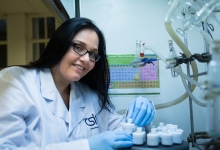Medicinal chemistry
Medicinal chemistry is the application of biology and chemistry to the design of new drugs for treating diseases. The CSIR’s medicinal chemists apply knowledge of chemistry, biochemistry and physiology to generate solutions to health-related problems.
The CSIR has worked on several projects that relied on medicinal chemistry, such as exploiting advances in disease modelling to develop new generation drugs against malaria transmission. The CSIR forms part of a larger team called the South African Malaria Transmission-blocking Consortium. The consortium has begun screening vast libraries of synthetic compounds that could be used in a new generation of antimalarial drugs. These drugs will disrupt the life cycle of the parasites that cause malaria, paving the way for the eradication of the disease. Compounds that meet the criteria and exhibit the ideal characteristics required for further development through our collaborative partners have already been identified.
The CSIR is also applying its medicinal chemistry expertise in a collaborative project with the University of Pretoria (UP). The project focuses on identifying novel drugs for the treatment of Alzheimer’s disease through target-based research. The synthetic work on this project is undertaken at UP and the CSIR assists with structure-aided drug discovery by visualising the docking of compounds into the active site of the enzyme and then correlating this back to the biological data obtained in vitro.
The CSIR has completed a research project into the development of drug-resistant anti-tuberculosis agents that showed good selectivity for mycobacteria and reduced cytotoxicity, through an as-yet-unidentified novel mode of action. The scaffolds were selected from South African indigenous plant species and were subjected to standard structure-activity relationship modifications. The work was conducted in collaboration with researchers at Stellenbosch University and the University of Cape Town.






